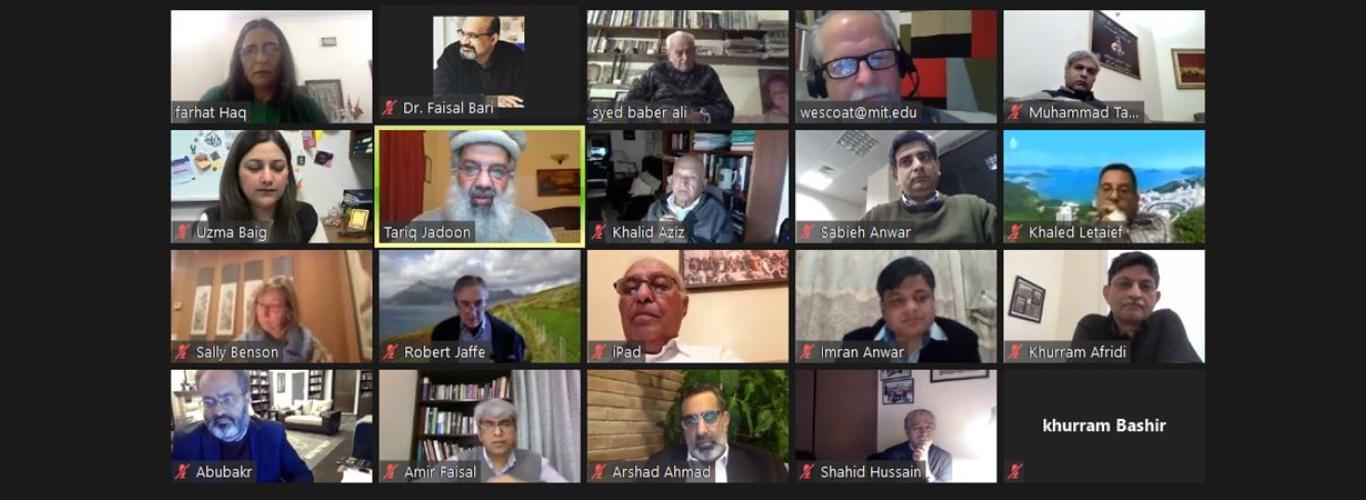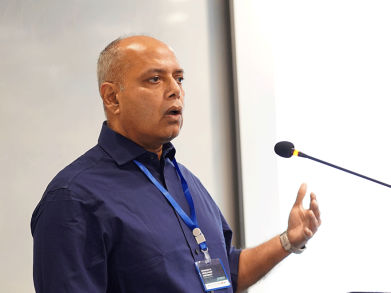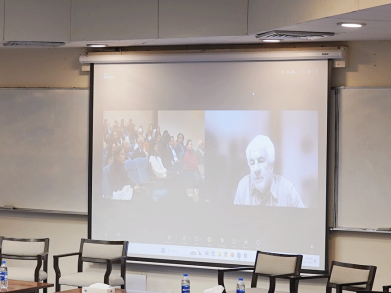SBASSE Leadership Comes Together for Virtual Advisory Board Meeting
The Syed Babar Ali School of Science and Engineering (SBASSE) at LUMS recently held its 21st Advisory Board meeting. The sessions commenced on January 25, 2021, and for the first time, were held virtually. Over the course of three days, the Advisory Board received updates on the latest developments and key achievements at SBASSE, and across the University.
Members of the Advisory Board, as well as senior leadership at LUMS, including Syed Babar Ali, Founding Pro Chancellor; Dr. Shahid Hussain, Rector; Dr. Arshad Ahmad, Vice Chancellor; and Dr. Sabieh Anwar, Dean SBASSE, attended the meetings. Chairs of different departments within the School, as well as various faculty members also participated in the sessions. For the first time, some of the sessions were also open to PhD students at SBASSE, in line with the School’s vision of engaging them as co-learners and co-leaders.
Dr. Ahmad welcomed the attendees to the meeting, and provided an overview of developments at the University, particularly in the wake of the COVID-19 pandemic. “We are right at a point in time where we need to amplify a few big ideas and make prudent choices and develop initiatives that will scale to have a national and regional impact,” he said.
Dr. Ahmad also introduced Dr. Farhat Haq, Provost, and Dr. Tariq Jadoon, Vice Provost during the meeting. Dr. Haq provided an overview of the Provost’s Office, and shared how it will play a key role in supporting SBASSE, as well as the overall University. She noted that SBASSE has been a pioneer in terms of their tenure promotion system, and expressed that the team is working to expand the framework to hire, mentor, and retain the best faculty throughout LUMS.
The School’s Dean, Dr. Sabieh Anwar, also apprised the Advisory Board of the initiatives undertaken by SBASSE in the past year. He stated that in 2020, 20 students completed their PhD degrees at SBASSE - a record number in the School’s 12-year history. Dr. Anwar also shared that his vision for the School is to be a forerunner of change and social transformation in Pakistan. He highlighted that the School’s PhD programme is a testament to that, as it offers social mobility and uplift to its graduates who go on to make a positive impact on society.
Dr. Anwar also shared SBASSE’s commitment to inculcating a culture of transdisciplinary learning, and the vision to have cross-departmental engagements – whether in the form of joint teaching of courses, or joint supervision of research. “The conjunction ‘and’ between ‘Science and Engineering’ is itself an emblem of interdisciplinary, and you don’t find that anywhere else in Pakistan,” he pointed out.
Additionally, he provided an overview of the School’s research endeavours that aim to solve the grand challenges of the world. Most of the research at SBASSE falls under 7 categories ranging from Sustainable Innovation in the Food-Water-Energy Nexus; The Quantum Revolution; Health and Medicine; Technology and Development; Numerics and Mathematical Modelling; Nanomaterials and Computational Material Science; and Revolutionising the Internet of Things Technologies.
Department Chairs also went on to provide a finer view of their respective departments, by sharing an outline of the respective achievements, research and initiatives underway.
During the meeting, LUMS faculty members also had an opportunity to share the developments from various research projects that represent evolving synergies within the School. These ranged from work on Lahore’s air quality, malnutrition and biosafety labs, innovative farming, and brain tumours, to projects dealing with the quantum revolution, fake news to disease tracking.
Attendees also had the opportunity to see snapshots of the research work done by the inaugural winners of the Syed Babar Ali Research Awards. Set up through the Babar Ali Foundation, these awards recognise the most potentially high-impact work carried out by current SBASSE PhD students. The researches covered a wide range of topics from the discovery of inhibitors against the Hepatitis C virus and locally building optical sensors, to helping people with autism and developing novel signal processing techniques for applications in cosmology. The presentations were an exciting glimpse into the quality of graduate research being done at the Syed Babar Ali School of Science and Engineering under the guidance of its excellent faculty.
The sessions were all highly interactive, with the Advisory Board members sharing their feedback, comments and suggestions. The discussions paved a positive path for the School in the upcoming years.
The meeting ended with a commemoration ceremony in honour of the late Professor Stephen Berry, a founding member of the SBASSE Advisory Board. Professor Berry was passionate about spreading scientific literacy across the world, and made a range of experimental and theoretical discoveries, both within his discipline and beyond, that have a tremendous impact on the study of chemistry even today. His colleagues remember him fondly, and shared warm anecdotes in his remembrance.
Members of the Advisory Board in attendance included Dr. James Wescoat (MIT, USA), Dr. Sally Benson (Stanford University, USA), Dr. Khurram Afridi (Cornell University, USA), Dr. Khalid Aziz (Stanford University, USA), Dr. Khaled Letaief (Hong Kong University of Science and Technology, China), Dr. Robert Jaffe (MIT, USA), Dr. Sarfraz Khurshid (University of Texas, USA), Dr. Hamid Zaman (Boston University, USA), Dr. Dara Entekhabi (MIT, USA), Professor Asad Ali Abidi (UCLA, USA), Dr. Michael Pecht (University of Maryland, USA), Ms. Mubarik Iman (Facebook), and Dr. Bud Homsy (University of Washington, USA).























